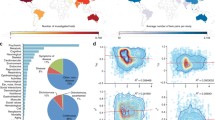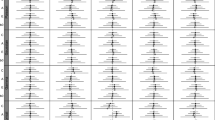Abstract
Individual differences in the human genome may now be measured with molecular genetic techniques. Therefore, dizygotic (DZ) twins may be classified as sharing two, one, or zero “genes” identical by descent for any measured polymorphism. As a result, we may partition genetic variation into two sources: (i) genotypes at and closely linked to particular marker loci identified with restriction fragment length polymorphisms (RFLPs) and (ii) other genetic variation. The power of the classical twin study to reject false models lacking either a marker effect or a residual genetic effect is explored. Additivity of genetic effects at or near the locus and of the residual genetic variation as well as random environmental variation are assumed. Results indicate that statistical rejection of models could be achieved with sample sizes which are within the range of several current twin registers. A design including monozygotic (MZ) twins is compared with one consisting of only DZ twins. MZ twins add considerable power for the detection of residual genetic variation but provide no information to resolve genetic marker effects.
Similar content being viewed by others
References
Heath, A. C., Neale, M. C., Eaves, L. J., and Fulker, D. W. (1989). Testing structural equation models for twin data using LISREL.Behav. Genet. 19:9–35.
Martin, N. G., Eaves, L. J., Kearsey, M. J., and Davies, P. (1978). The power of the classical twin study.Heredity 40:97–116.
Morton, N. E., and Maclean, C. J. (1974). Analysis of family resemblance. III. Complex segregation of quantitative traits.Am. J. Hum. Genet. 26:489–503.
Nance, W. E. (1980). The value of population based twin registeries for genetic and epidemiologic research.Banbury Rep. 4:215–234.
Nance, W. E. (1984). The relevance of twin studies to cardiovascular research.Prog. Clin. Biol. Res. 147:325–348.
Author information
Authors and Affiliations
Additional information
This work was supported in part by NIH Grants HL 31010 and DK 39817, NATO Grant 86/0823, and grants from the Belgian National Research Fund, the state University of Gent, and the Catholic University of Leuven. We gratefully acknowledge the advice and encouragement of Drs. Lindon Eaves and Nicholas Martin.
Rights and permissions
About this article
Cite this article
Nance, W.E., Neale, M.C. Partitioned twin analysis: A power study. Behav Genet 19, 143–150 (1989). https://doi.org/10.1007/BF01065889
Issue Date:
DOI: https://doi.org/10.1007/BF01065889




